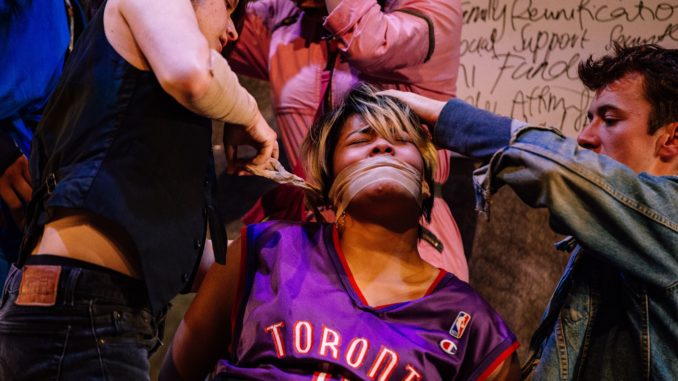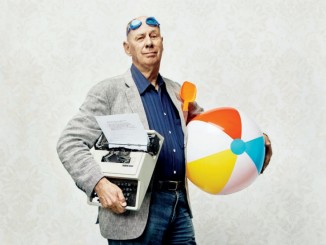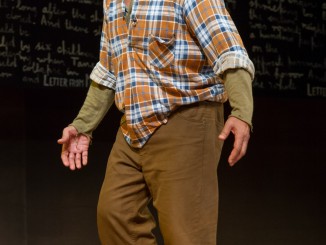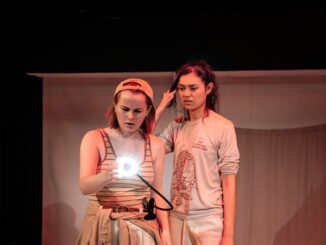
A sobering look at the underbelly of Auckland’s queer community
In 8 Reasonable Demands, playwright Joni Nelson asks the audience to consider the extent to which we take fundamental living standards for granted. At the ASB Waterfront Theatre, six characters find their lives upended by a life-changing decision to hold the government to ransom using leverage acquired by the use of force. Directed by Leon Wadham, the cast navigate a fraught emotional landscape that exposes the audience to realities we sweep under the carpet on a daily basis so that our comfort zones remain ‘intact’ to make life ‘easier’ for ourselves.
We are greeted by an elaborate set with homely-looking furnishings designed by Michael McCabe, including a couch and a tastefully-painted wall with a white door and a single ‘Free Chelsea Manning’ poster next to it. The lights go up, and we see a squabble ensue mid-sentence as three friends arrive home from an unknown sojourn. It creates a sense of everyday routine, as though I am witnessing something that happens on a regular basis.
The agitation among the characters is introduced through the dialogue, but is made more urgent as visual cues create a sense of alarm, as characters fuss over each other in the way familiar to families of choice in the queer community. This amplifies our curiosity as to what the mystery could possibly be, and what secrets the characters are keeping from each other. The consistent message throughout is that we are not as progressive as we might imagine ourselves to be in Auckland, particularly whenever we come across trans individuals.
The pace of the performance ramps up when the dilemma is revealed at the end of the first third of the story, and the characters decide to go to bed, allowing for more intimate conversations. The characters reveal their innermost fears and vulnerabilities, divulging what they love and what they loathe about themselves and those around them, the actors revealing the characters’ most authentic facets to a bewildered audience. In every exchange that follows, the impending sense that trouble is brewing beyond the locked bathroom door (offstage), provides a push for the characters to cut through the artifice and talk about what is really going on for each of them.
The play matter-of-factly puts forward stubborn facts about cost of living, food poverty and transphobic violence – there is a sense of resignation with which the characters face the institutional barriers erected for them that we usually gloss over in everyday life. They also confront their own mortality, shocking the audience with the near-comical anecdotes of how society treats those who don’t conform to the norm – especially the ‘T’ in LGBTQI+. This combination comes across as confronting but sorely needed, given that we pride ourselves on safeguarding our comfort zones against the slightest hint of risk as we go about our daily lives in Auckland. This is rendered a much more stark contrast due to the relative absence of trans creatives in the theatre community in this city. These realisations present us with a pointed question: what are we doing to address our failures when the queer community is let down by all of us remaining silent?
We are reminded of this by the persistently caustic tone that pervades the rest of the play, highlighted by the subtle lighting design (by Zach Howells) which raises the general sense that a reckoning has arrived. McCabe’s set acts as an anchor for the lingering sense that what has gone on in this play could conceivably happen in any part of the queer and trans communities. This is reinforced by the authentic costume design by Alison Reid.
8 Reasonable Demands features a competent performance by the ensemble cast, but their acting strengths shine, and Wadham’s direction is most finessed, where more intimate conversations take place between two or three characters. It is difficult to understand all-cast scenes where the characters are yelling over each other, simultaneously bickering in several smaller groups across different areas of the set. I imagine this is meant to augment a general sense of panic, but it made it more difficult for me to hear the characters’ individual stories of anger and frustration, and detracted from the wit of Nelson’s writing.
The actors accomplish their goal of unsettling the audience by stripping away every layer of emotional facade that they wear as a second skin. Sherry Zhang’s performance as Kelly stands out for the emotional growth we are able to witness from beginning to end. I was, however, perplexed by the subplot about assault, since it felt unsatisfactorily addressed in the last quarter of the play. I also found Crystal’s character (played by Daedae Tekoronga-Waka) to be the least multi-dimensional, since we are seldom given an insight into their background. Neither of these detracted from the feeling of emerging unnerved from the theatre, which speaks to the playwright’s strengths.
A moment that resonates with me is the adamant attitude of the characters of colour to voice their fears and desires in an atmosphere where Pākehā characters repeatedly try to marginalise them. On reflection, another moment would be the cleverly-written undertones around defending white male patriarchal power. This power is projected by loudly staking a claim to masculine authority, personified here in the character of Matt, in a nuanced performance by Calum Hughes. The way in which individual courage is celebrated and yet can still be suppressed in the world outside of the play really stood out in the performance.
I found myself admiring the unfettered courage of addressing the theme of power dynamics within 21st-century expressions of racial superiority. This becomes all the more powerful as the characters discover the traitor in their midst, revealing the consistently ugly underbelly of what happens when asking better of the world through several reasonable demands, and compelling me to question what reason has to do with the choice to accommodate individuals on terms that they define for themselves in public and social spaces. I found myself torn between admiration and the levelling realisation of the extent to which my privileges as a wealthy queer male of colour affect my peers; this conflict sits at the core of how the performance succeeded in discomfiting me.
Nervous laughter from those sitting in the audience punctuates the experience of witnessing how the characters in 8 Reasonable Demands unravel one by one. Those seated around me could feel the awkwardness with every guffaw, possibly aimed at the sobering humour, which culminates in a vignette of the white male character who thrives on the chaos unleashed by the dilemma, and (spoiler?) emerges triumphant in power, stature and recognition by his peers.
What is to be considered reasonable is still filtered through the selective lens of the white heterosexual male gaze – this message echoes throughout 8 Reasonable Demands, probing how much all of us consider ourselves to be progressive, and what ‘progressive’ means. The cast and crew have delivered a powerful challenge to decision-makers across Auckland: how long can we sustain an enforced state of ignorance about how we all treat outliers and outcasts simply based on their refusal to conform to the stereotypes built by our comfort zones?
8 Reasonable Demands features in Auckland Theatre Company’s Here and Now Festival 2019 and plays until 29th April.
Written by Joni Nelson
Directed by Leon Wadham
Design by Michael McCabe, Zach Howells and Alison Reid
Featuring: Kierron Diaz-Campbell, Dadae Tekoranga-Waka, Calum Hughes, Lusia Neemia, Courtney Bassett, Sherry Zhang




Leave a Reply